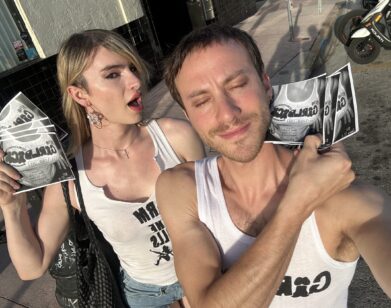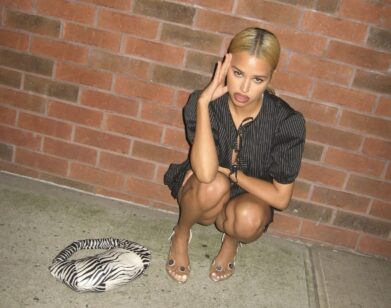John Waters
The interview that follows takes place in John Waters’s apartment in New York the day after a press preview for Cry-Baby, the Broadway musical based on the 1990 Waters film that launched the movie career of Johnny Depp. Since the Broadway success of Hairspray, it isn’t hard to imagine a whole slew of Waters’s movies becoming Broadway plays, operas at the Met, ice shows, and television series.
GARY INDIANA: Do you care about the presidential elections? Or do you think it’ll be the same old thing no matter who wins?
JOHN WATERS: I always vote. Sometimes I’ve voted more than once, illegally.
GI: Well, so did Edgar Allan Poe-in Baltimore, too.
JW: But you can’t anymore. The picture ID has ruined everything.
GI: When did you start working as a commentator for Court TV?
JW: I’m not a commentator for Court TV. I had a show on Court TV called ‘Til Death Do Us Part. Every week it was about real married couples who killed one another. I was kind of like the Rod Serling or the Alfred Hitchcock, making snide comments. I was the narrator, too. I’m right in the middle of negotiating the renewal of the show, but the channel is now called truTV. When they called me up, I was like, “Is it all about Truman Capote now?”
GI: So has the success of Hairspray gone to your bank account?
JW: Yes. I’ll say this: I’ve certainly made more from Hairspray-the musical, not the new movie-than anything I’ve ever made in my whole life. I’m very thankful to Mark O’Donnell and Thomas Meehan, who were very fair with me and brought me into the deal from the very beginning. It has been a great experience.
GI: You don’t involve yourself with the nuts and bolts of Broadway theater, right?
JW: Well, I’ve been involved on Cry-Baby from the very beginning. The people who have the jobs—I hired them with the producers. So I’m involved in that part of it. I’m like a studio executive. I certainly had a big word in who was hired and the creative team. I had a word in who was cast, and I give notes on the script. I have gotten so spoiled by Broadway. It’s gone really smoothly. Sometimes I imagine that people think I was this idiot savant sitting around Baltimore in a trailer, eating shit and dating drag queens. I understand what they mean. But, I’ve always been optimistic. I’ve always believed anything could happen in America and in show business. Hairspray [1988] and Cry-Baby were the two movies I would have picked to put onstage. I want Pink Flamingos [1972] to be an opera. It was optioned once to be one-actually, they never paid the option. But it could be a good one.
GI: What else are you working on now?
JW: I’m writing a book for Farrar, Straus and Giroux called Role Models, and I’m working on my movie. It’s written. We were hoping to shoot it this winter because it’s a terribly wonderful Christmas movie. It’s called Fruitcake. We’re hoping to shoot now in Baltimore in ’09. I am also having two art shows-one at Marianne Boesky and the other at Gagosian Gallery in L.A. Then I have Cry-Baby opening. That’s a lot, isn’t it? I have a lot of folders on my desk.
GI: Maybe they’ll do another Broadway musical version of one of your movies. I thought maybe Pecker [1998] or Serial Mom [1994].
JW: Serial Mom has been pitched as a weekly TV series. That seems better to me, where each week she kills someone for her kids and for political correctness. That’s an idea that’s out there—a folder that I didn’t tell you about. I thought that Female Trouble [1974] could be a great Broadway musical because the main character can end the finale in the electric chair with all of the pro-death picketers outside the jail. That’s the one I’m pitching next. I don’t know about Pecker. It’s about the art world. People singing about contemporary art, minimalism, discounts, and killing rooms-that’s maybe a new concept. I don’t know how wide-reaching it would be.
GI: So this may be not very nicely phrased, but, you know, you have a trademark look and a trademark personality, and I happen to know that you are very thoughtful and a really quite serious person in your everyday life.
JW: Yes, I’m serious about my career.
GI: But you’re also very erudite and you have a lot of qualities that would be considered intellectual by the people who maybe think of you in a different way.
JW: Okay.
GI: Do you ever feel that you have to conceal part of yourself to project-
JW: I know what you’re saying. No, because I actually think that my films are intellectual. I think almost everything I do is intellectual, but I would never say that, because that’s a compliment. That’s up to others to say about me. The same way, I would never say I do art. I think art is up to history. It’s up to other people to utter that word. So I try to be humble, and I never say anything bad about something unless it’s something that everyone in America loves and has made a million dollars. Who cares if I say anything? I learned a long time ago that people like my work because I praise things that others don’t like, and as soon as I say something negative about somebody, I go to a dinner party and I’m seated next to them accidentally.
GI: I happen to know that the inspiration for Cry-Baby in the first place came from the work of Witold Gombrowicz.
JW: I don’t know that it really came from him. I mean, I love him and I read him. But why do you say the inspiration for Cry-Baby came from him?
GI: I thought you told me it did.
JW: I don’t think I did. I love his work. I read his books when I worked at the Provincetown Bookshop-every one of them. And I loved when they had that revival, which you helped, by writing about him in Artforum and everything. The inspiration for Cry-Baby was a really cute guy who lived across the street from my parents. Everyone in the neighborhood hated this family because they were blue collar, and this guy was a juvenile delinquent. He had a car just like Cry-Baby’s in the movie. He never talked to me. He never looked at me. I hung around with his brothers so I could be near him, just to watch him. It wasn’t sexual-it probably was, but I didn’t even know it. But the inspiration all came from the one person on my street who everyone hated and who I wanted to be. It was 1954. I was only 8 at the time. In the movie, Ricki Lake calls somebody a “scrape,” which, you know, is like half-square. I certainly was raised to be a square. Mrs. Vernon-Williams’s character is very much like how I was raised. I went to cotillion and all that stuff, and everyone was more prejudiced against poor white people than they were against black people. I’d already made a movie about the unfairness of race that I remembered growing up, and this was a movie about the unfairness of class. Those are the only two nostalgias I have. Once you’re past 20, I don’t think you can really have nostalgia. It’s about the first things you remember.
GI: Well, what I meant was—for example in Ferdydurke, which Gombrowicz wrote, there’s a duel of . . . um, you know . . . the grimaces.
JW: To be honest, Gary, I read those Witold Gombrowicz books so long ago. I haven’t read Ferdydurke in 30 years. So I forget some of it. It could have been in my mind somewhere, in the same way that when I had that TV show on the here! channel, I showed weird movies. I found Isabel Sarli in Fuego [1969], and I showed it. I didn’t realize, but there’s a scene of the character in that movie walking through Times Square. Well, that certainly was a hint toward me shooting Divine like that in Pink Flamingos. I didn’t remember that, but when I saw it, I thought, “Oh, this is where that came from.” The same way people always say to me, “Well, obviously you named Divine after Jean Genet’s character.” Which I must have, but I remember naming him because of the word “divine” in the Catholic Church that they used all the time. People say, “It had to come from that.” But I don’t remember it really coming from that.
GI: Oh, no, I didn’t mean to suggest that it was a conscious thing. For me, if I’m writing a novel or something, I may not be able to locate the things that come to me until long afterward.
JW: But you don’t have to with a novel. As a matter of fact, if you can locate those things, it’s bad.
GI: Would you ever consider making a comedy about school shootings?
JW: No, because Gus Van Sant has already made a movie about that subject [Elephant, 2003] and a pretty great one. It’s not a comedy. But when I went to school, they didn’t shoot. They stabbed. Or beat you up in the hallway.
GI: There was a great line in the tabloids when that guy ran amok in the mall at Christmas. They said it was “the biggest mass murder in American history since last April.”
JW: To me, the best headline of last year was in the New York Post when Ike Turner died. It was ike beats tina to death. Brilliant.
GI: But it’s my theory that the school shootings have pre-empted serial killing because kids are getting started much earlier now.
JW: They are. But, you know, The Bad Seed and Cries Unheard: The Story of Mary Bell-they were early starters. I probably would not make a comedy about the school killings. It’s hard to parody something like that right now, because it’s too current. Maybe in 10 years you could. I doubt I would even do a high school scene right now because I don’t know what it’s like. When I did high school scenes in my films, I did them from my memory—and I haven’t been in a high school in a long time.
GI: Do you have a middle name?
JW: Yes, Samuel. My porn name, if you’re supposed to take your middle name and the name of the street you grew up on, would be Samuel Clark. That’s not a very good porn name.
GI: In 20 years, it will be. Cry-Baby really put Johnny Depp on the map.
JW: Well, he was on the map because he was a big TV star on 21Jump Street.
GI: He was on 21 Jump Street . . .
JW: Yeah, yeah. But being in Cry-Baby did what John wanted to do, which is negate his teen-idol image. Tim Burton came in and saw the dailies on Cry-Baby and put him in Edward Scissorhands [1990]. So, yeah, it did work, him doing that.
GI: Now, if a movie is going to be made from the musical version of Cry-Baby, which I assume it will be-
JW: Well, you can’t assume that. Let’s see if the musical is a hit first. I’m much more of a guarded optimist. But you know what they do is they get a new star. I mean, certainly they didn’t use the star of Hairspray on Broadway in the new movie, either. I’m not saying that they won’t use this guy James [Snyder], but it has to be a new person. It will be someone who will have to get compared to Johnny Depp, who has, singularly, the best career of any American actor right now. This is a story about blue-collar, straight boys who can sing and dance. Actors who can play all that are very tough to find-though, I do think we’ve got the sexiest cast.
GI: They look fantastic.
JW: I’m very happy with them. Will they use them if they make another movie of Cry-Baby? I have no idea. You know, it took me a while to figure it out, but to have a real hit on Broadway, you have to get the respected Broadway people to like it. But then the production also has to appeal to the most middle-class people who know nothing about Broadway and who come to see it five years later. That’s why later we had Beaver Cleaver in Hairspray playing Wilbur. I was thrilled, though. I couldn’t believe that I was watching the guy who played Beaver Cleaver dancing with a man in drag-because of me somehow. I thought it was the ultimate perversity. When David Nelson from Ozzie & Harriet was playing the father of Traci Lords’s character in Cry-Baby . . . These are the kinds of things that impress me. I think, How did this happen? It’s way more devious than Pink Flamingos running at midnight.
Watching the guy who played Beaver Cleaver dancing with a man in drag . . . It’s way more devious than Pink Flamingos running at midnight. JOHN WATERS
GI: Do you think Interview magazine should expand its celebrity preference and start interviewing criminals?
JW: Maybe, if it was done seriously, yes. If it was done with a smart-aleck attitude, no. I think if you have an intelligent interview with someone who maybe was rehabilitated or a famous criminal who has come to terms with what they’ve done, then yes. If it’s just going to be the most hideous criminal of the week, I don’t think it would work. Now, of course, you could do the guy who’s getting out of prison soon, the one in Party Monster [2003], Michael Alig. He wrote me a letter.
GI: Well, I don’t necessarily mean murderers.
JW: Oh, I know, but you mean criminals of any kind.
GI: Yeah.
JW: But, you mean, unfamous ones?
GI: Yeah.
JW: Just the ones who are cute?
GI: No, well. . . . Good point.







